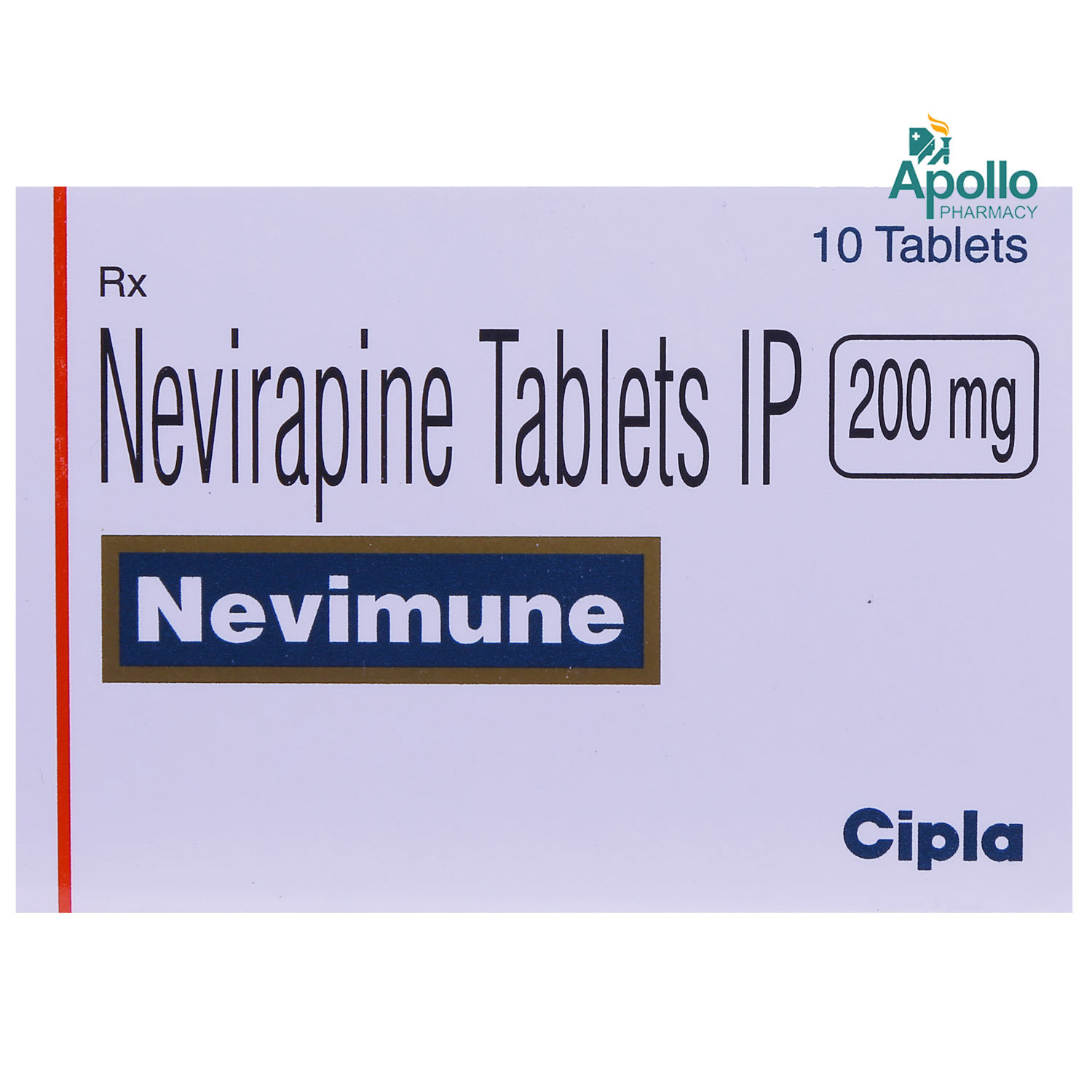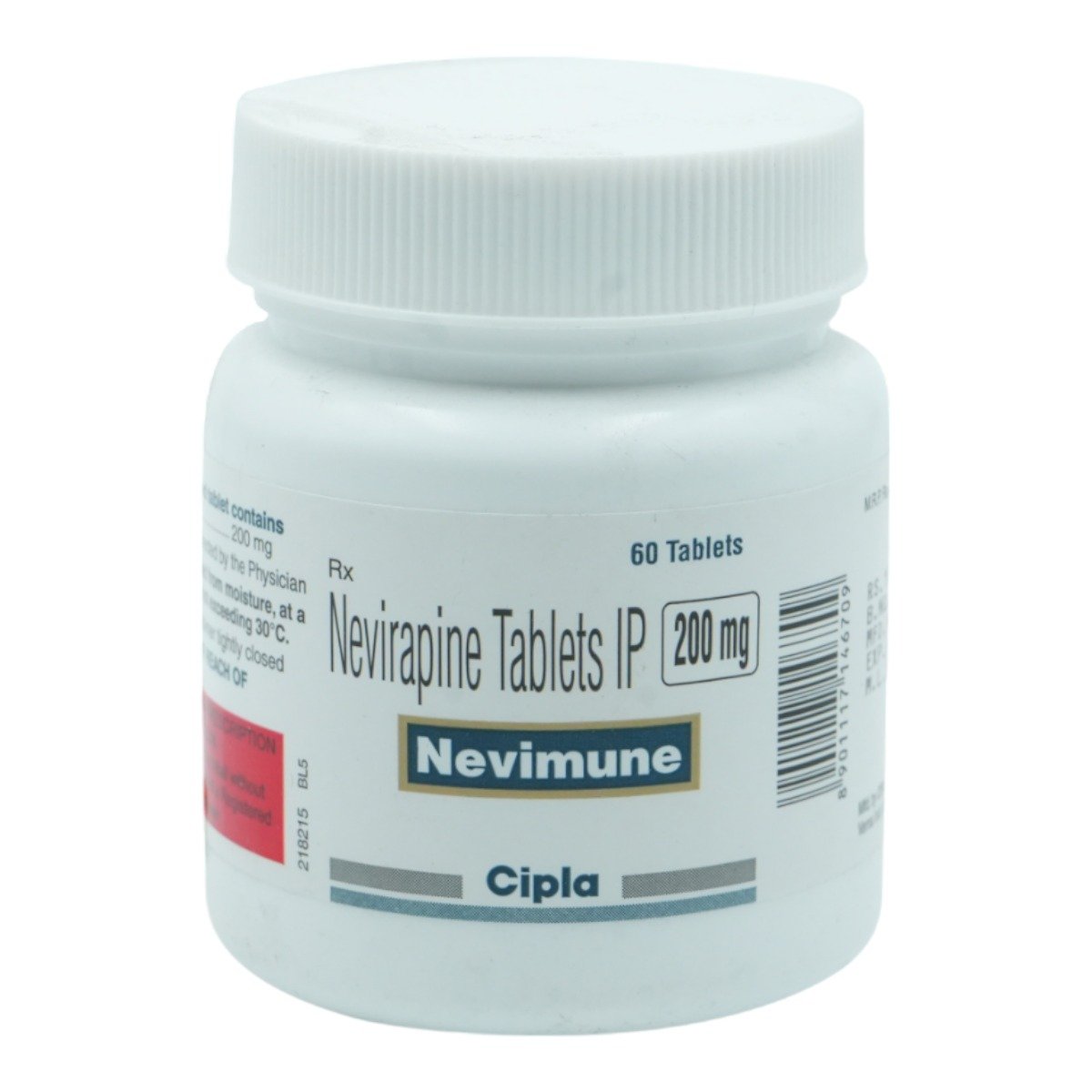Nevirapine
About Nevirapine
Nevirapine is an antiretroviral medicine used in the treatment of HIV. Human Immunodeficiency Virus (HIV) is a retroviral infection that attacks and damages the cells of the immune system. This weakens the ability to fight against infections and diseases. If this condition is left untreated, it can lead to Acquired Immuno Deficiency Syndrome (AIDS). Nevirapine is combined with other antiretroviral medicines to treat HIV infection.
Nevirapine contains Neviparine, which belongs to the class of non-nucleoside reverse transcriptase inhibitor (NNRTI). It works by inhibiting the HIV reverse transcriptase enzymes that are necessary for the virus's DNA reproduction. This causes inhibition of DNA replication and thereby prevents further spread of infection.
Nevirapine may cause side effects such as nausea, headache, abdominal pain, loss of appetite, vomiting, fatigue, diarrhoea, myalgia (muscle pain), skin rash and other allergic reactions. Most of these side effects do not require medical attention and gradually resolve over time. However, if the side effects persist, please consult your doctor. Nevirapine should be taken as advised by your doctor. Your doctor will decide the dose of the medicine based on your health condition. Do not take more than the recommended dose.
Nevirapine should be avoided if you are allergic to it. This medicine is contraindicated in patients with moderate to severe hepatic impairment or used as an occupational or non-occupational post-exposure prophylaxis. Nevirapine is known you cause fatal or non-fatal hepatotoxicity and skin disorders. Hence, careful monitoring should be done during the first 18 weeks of the treatment initiation. Before taking this medicine, inform your doctor if you have liver/kidney disease, hypersensitivity reactions, Stevens-Johnson syndrome, toxic epidermal necrolysis, cirrhosis, or hepatic fibrosis. If you are pregnant and breastfeeding, let your doctor know before taking Nevirapine. Nevirapine should be used in children only if recommended by the doctor.
Uses of Nevirapine
Medicinal Benefits
Nevirapine contains Neviparine, which belongs to the class of non-nucleoside reverse transcriptase inhibitor (NNRTI). It works by inhibiting the HIV reverse transcriptase enzymes that are necessary for the virus's DNA reproduction. This causes inhibition of DNA replication and thereby prevents further spread of infection. Nevirapine is used in combination with other antiretroviral medicines to help reduce the symptoms, control the infection, and prevent opportunistic infections effectively. It also helps in improving the quality of life of a patient with HIV.
Directions for Use
- Nevirapine can be taken with or without food because food does not impact its effectiveness.
- It is usually taken once or twice a day; however, follow your doctor’s advice regarding the dosage and duration.
- Swallow the medicine as a whole with a glass of water.
- Do not break, chew or crush Nevirapine.
Storage
Side Effects of Nevirapine
- Nausea
- Abdominal pain
- Vomiting
- Joint ache
- Fatigue
- Loss of appetite
- Myalgia
- Skin rash
- Diarrhoea
- Headache
Drug Warnings
Nevirapine should be avoided if you are allergic to it. This medicine is contraindicated in patients with moderate to severe hepatic impairment or used as an occupational or non-occupational post-exposure prophylaxis. This medicine should only be prescribed in patients with CD4+ greater than 250 cells/mm3 (females) and 400 cells/mm3 (males). Inform your doctor about your medical history and the medicines you take to prevent possible interactions. Nevirapine is known you cause fatal or non-fatal hepatotoxicity and skin disorders. Hence, careful monitoring should be done during the first 18 weeks of the treatment initiation. If the patient develops any signs or symptoms of hepatitis, increased transaminase, rash, or hypersensitivity reactions, Nevirapine should be discontinued immediately. This medicine may cause dizziness; hence, avoid driving or operating machines while taking Nevirapine. Before taking this medicine, inform your doctor if you have liver/kidney diseases, hypersensitivity reactions, Stevens-Johnson syndrome, toxic epidermal necrolysis, cirrhosis, or hepatic fibrosis. If pregnant and breastfeeding, inform your doctor before taking Nevirapine. Nevirapine should be used in children only if recommended by the doctor. If prescribed, the child should be carefully monitored for any changes. Nevirapine treats the infection but does not cure or prevent it.
Drug Interactions
Drug-Drug Interactions: Nevirapine may interact with contraceptives (ethyl estradiol, norethindrone), immunosuppressants (cyclosporin, sirolimus, tacrolimus), anti-cancer medicine (cyclophosphamide), Antiarrhythmic drugs (Amiodarone, disopyramide), anticonvulsants (carbamazepine, clonazepam), antifungals (itraconazole), antiviral medicine (ritonavir, indinavir, lopinavir).
Drug-Food Interactions: Avoid smoking and alcohol consumption.
Drug-Disease Interactions: Inform your doctor if you have moderate to severe hepatic impairment, Stevens-Johnson syndrome, toxic epidermal necrolysis, cirrhosis, hepatic fibrosis, and other skin disorders before starting treatment with Nevirapine.
Drug-Drug Interactions Checker List:
Safety Advice

Alcohol
unsafeAvoid alcohol consumption while on treatment with Nevirapine. Alcohol intake might increase the risk of stomach or intestine bleeding.

Pregnancy
consult your doctorIf you are pregnant or suspect you may be pregnant, inform your doctor before taking Nevirapine. Your doctor will prescribe a suitable dose of this medicine to prevent maternal-fetal HIV transmission.

Breast Feeding
unsafeNevirapine is excreted in milk. If you have HIV or are taking Nevirapine, you should not breastfeed your baby.

Driving
unsafeAvoid driving vehicles after taking Nevirapine as it may cause fatigue.

Liver
cautionNevirapine can result in serious, sometimes fatal, liver damage. Inform your doctor if you have or have had a liver illness, particularly hepatitis B or C. Your doctor will most likely advise you not to take Nevirapine.

Kidney
cautionBefore using Nevirapine, inform your doctor if you have or have ever had kidney disease, particularly if you are on dialysis treatment.

Children
consult your doctorPlease consult your doctor. Your doctor will decide the dose of this medicine based on the age and condition of your child.
Habit Forming
Diet & Lifestyle Advise
- Eat a healthy and balanced diet. Eat vitamin and nutrient-rich food such as vegetables and fruit as it helps to boost your immune system. Try to take lean protein and whole grains.
- Avoid eating raw meat and eggs. Consume properly boiled and cooked meat, poultry or seafood.
- Eat bland and low-fat foods, and avoid spicy or oily foods if you experience nausea or vomiting.
- Get tested for other sexually transmitted infections, such as gonorrhoea or syphilis.
- Try to reduce emotional and physical stress by spending time with your family or doing whatever makes you happy.
- Drink more fluids and avoid alcoholic beverages to prevent dehydration.
- Never share personal items with body fluids or blood on them, such as razor blades or toothbrushes.
- Avoid sharing used needles, other injection or drug equipment.
Special Advise
- Get an HIV test done at least every three months.
- Nevirapine may still develop infections or other illnesses associated with HIV infection or AIDS. So, people taking Nevirapine should be carefully monitored throughout the treatment.
- Regular liver function and CBC tests while taking Nevirapine are advised.
Patients Concern
Disease/Condition Glossary
HIV Infection: Human Immunodeficiency Virus (HIV) is a retroviral infection that attacks and damages the cells of the immune system. This weakens the ability to fight against infections and diseases. If this condition is left untreated, it can lead to Acquired Immuno Deficiency Virus (AIDS). Symptoms of HIV include headache, fever, chills, joint pain, fatigue, swollen lymph nodes, sore throat, mouth nodes, muscle aches, etc. Nevirapine helps reduce the symptoms, control the infection, and also helps improve the HIV patient’s quality of life.
FAQs
Nevirapine is used to treat HIV infection.
Nevirapine contains Neviparine, which works by inhibiting the HIV reverse transcriptase enzymes that are necessary for the virus's DNA reproduction. This causes inhibition of viral replication and thereby prevents further spread of infection.
No, completing the entire treatment course prescribed by the doctor is always recommended. Sudden discontinuation of the medicine can lead to serious side effects. Your doctor will decide whether to stop the medication or not.
Nevirapine does not cure HIV infection. However, it helps to control the disease and prevent opportunistic infections. Nevirapine is used in combination with other anti-retroviral medicines.
Nevirapine is an antiretroviral medicine. It contains Neviparine, which belongs to the class of non-nucleoside reverse transcriptase inhibitors (NNRTI) used to treat HIV infection.
Yes, Nevirapine is safe if taken in the dose and duration prescribed by the doctor.
Nevirapine can be taken with or without food. Swallow it as a whole with a glass of water. Do not chew, crush, or break the medicine.
Yes, Nevirapine is an effective antiretroviral medicine used in the treatment of Human Immunodeficiency Virus (HIV) infection.
If you miss a dose of Nevirapine, take it as soon as you remember. However, if it is almost time for the scheduled dose, skip the missed dose and take the next dose at the scheduled time.
Nevirapine may cause side effects such as nausea, headache, abdominal pain, loss of appetite, vomiting, fatigue, diarrhoea, myalgia (muscle pain), skin rash and other allergic reactions. Most of these side effects do not require medical attention and gradually resolve over time. However, if the side effects persist, please consult your doctor.






